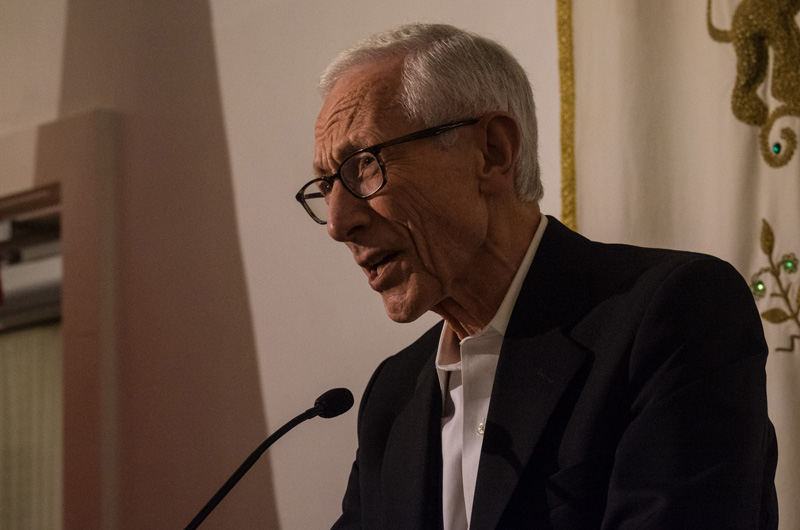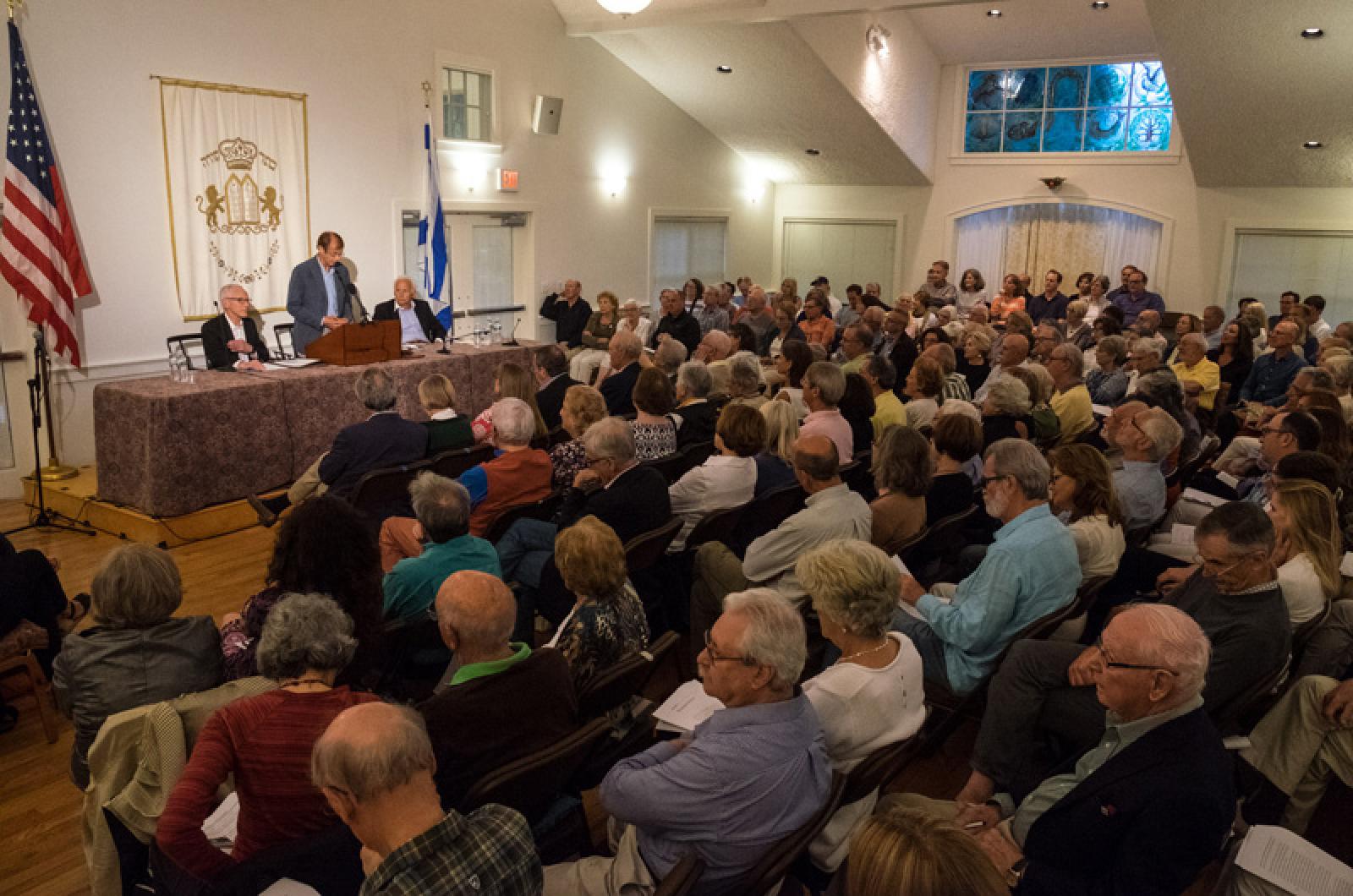Three leading voices in U.S. policy and economics spoke optimistically about the prospects for the U.S. economy before a near-capacity crowd at the Martha’s Vineyard Hebrew Center last week.
About 330 people attended the panel discussion on Thursday evening, the first of the Hebrew Center’s Summer Institute series. Joleen King, program administrator for the institute, said it marked a new record for the series.
Allen Sinai, chief global economist and president of the advisory firm Decision Economics, led the discussion, which touched on political and societal backlash against President Trump, long-term trends in labor productivity in the United States, and anomalies in the current U.S. business cycle.
The panel also included Stanley Fischer, vice chairman of the Federal Reserve System and former chief economist at the World Bank, and Kenneth Adelman an American diplomat and policy analyst who served as an advisor to President Ronald Reagan.
Mr. Adelman kicked things off by listing nine ways in which Mr. Trump has at least ironically kept his campaign promise to make America great again.
“Donald Trump has made Alec Baldwin great again,” Mr. Adelman said, referring to the actor’s role as a Trump impersonator on Saturday Night Live. Mr. Trump has also made media great again, he said, citing a tenfold growth in subscriptions to the New York Times since the election, and other major outlets like CNN and the Wall Street Journal also benefiting.
“This is a worldwide phenomenon,” Mr. Adelman said. “The press is really flourishing as never before.”
Among Trump’s other accomplishments, Mr. Adelman said, has been a revival of anti-Russian policies, given the investigations underway into his connections to the Russian government, and a resurgence in state and local activity in opposition to his policies, including his decision to pull out of the Paris Climate Agreement.
Finally, Mr. Adelman noted that Mexican cuisine was up 20 per cent over last year. “I leave you with this profound thought,” he said. “After all is said and done, Donald Trump has made tacos great again.”
Mr. Fischer brought a more solemn tone to the discussion, delivering an economic lecture about labor productivity since 1948.
“I’m going to make you suffer,” he jokingly told the audience. “It’s not intentional; I find it interesting.”

Focusing on four major periods, between 1948 and 2016, he explained how labor productivity is influenced by government policy, public and private investment, technological innovation and labor quality.
The post-war period from 1948 to 1973 saw the fastest growth in productivity, he said, with productivity from 1974 to 1995 falling by half. With the exception of the internet technology boom from 1996 to 2003, he said, productivity growth in the U.S. has remained low since 1974.
“In case you think things are getting better, the record for the past five years is the worst ever,” he said, noting only 0.5 per cent growth per year during that period.
But he remained optimistic that technological advancements since the 1990s have yet to make their full impact.
For a long time, he said, innovation was the key factor in determining productivity growth, with the recent slowdown due largely to declining innovation and government funding. The prospects for innovation in the future are hotly debated, he said, with some arguing that the data don’t reflect the real world, and others projecting that innovation will support growth in the future.
“I think this is something that depends — what you believe — on your research and also on whether you are an optimist or pessimist,” Mr. Fischer said. “If you are an optimist you say we don’t know what is going to change. . . . I think that the emergence of disease treatments based on genetics, the falling costs for conventional and alternative energy production, and many other things suggest that we will continue to innovate.”
In closing, he said government funding, which has declined dramatically since 1970 while private investment has soared, could help boost productivity in the future.
“Broadly speaking, government policy works best when it can address a need that the private sector neglects, and that includes investment in basic research, infrastructure, early childhood education, schooling and public health,” he said.

Mr. Sinai had a similarly optimistic view in regard to U.S. business cycles, which he compared to human physiology. He said the current business cycle has lasted longer than any other with the exception of the 1990s.
“The hearts, the valves, the lungs look as good today as they looked at the beginning of this eight years ago,” he said. “The spirit is good out there.”
He cited “tremendous cash flow” in the business sector, with banks also enjoying good health. He compared monetary and fiscal policies to a sort of economic medicine, although the influence of what he called Trumponomics has yet to be fully understood. But he also noted that the President’s proposed spending increases and other economic policies appear to be stalled in Washington.
He pointed to apparent anomalies in the system, including a simultaneous drop in unemployment and inflation rates. “That’s not supposed to happen,” he said, predicting that inflation will stay below two per cent next year. He credited technological advancement, arguing that the data has yet to catch up with reality.
“You know it’s everywhere,” he said of technology. “It’s affecting inflation, but the economists can’t see it.” He recalled his own experience having to lower rents on a property he owns because of competition from the online rental marketplace Zillow, and the effect of other online services like Uber in keeping price inflation low.
“If the world of reality, of data, says something different than my models, I believe the world,” he said.
Along those lines, he said he was glad that former Goldman Sachs executives are now in charge of economic policy in Washington, since economics are too wrapped up in details. “For this part of it, I’ve got to give him good grades,” he said of President Trump. “Finally we have decision makers running the business of Washington.”
Questions from the audience drew further detail about the federal balance sheets, how to increase labor productivity and how political discord under the current administration might affect the national business cycle.
Jordan Cohen of Chilmark pointed to vast income disparity in the U.S., along with the hollowing out of the middle class and high unemployment in the Rust Belt. “These are potential disrupting influences in society that might alter the optimistic view that you’ve given us,” he said.
Mr. Sinai agreed. “Those are potentially deadly problems — and particularly the problem of inequality is one that can take down society through political disruption,” he said.
He added that economies could still manage to do well in countries where those conditions exist. “For awhile, but not forever,” he said.







Comments
Comment policy »